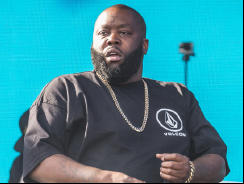
The Netflix show “Trigger Warning with Killer Mike” was released on Jan. 18.
Michael Render, famously known as Killer Mike, is half of the rap duo Run the Jewels, who released their 2016 album “Run the Jewels 3” to widespread acclaim. He’s released music on his own as well, as exemplified in the highly recommended 2012 album “R.A.P. Music.”
“I like My Woman, My Kids, Weed, Polo and Politics. I am a Pan Africanist Gangster Rapper, Civic Leader & Activist,” reads his Twitter bio.
The six episodes follow Render’s responses to many different questions, such as: how can we coexist and positively collaborate for the good of the American constituency when the country is systemically built on dividing people into mutually exclusive categories (such as socialist, capitalist, libertarian, Catholic, amongst other labels)?
In the episode answering this question, he goes to a retirement home and interviews an older woman who has highly antiquated rhetoric on race and crime in the U.S. Render takes this in stride and decides to perform a polarizing song about questioning institutional authority to the predominantly white retirement home in Atlanta, and when he receives a positive reception, he realizes that music can answer the aforementioned question and make the U.S. less divided.
This leads to him holding auditions for a diverse musical supergroup, and he hires people such as a white nationalist, a Juggalo, a feminist, and a Jewish Renaissance enthusiast to participate in the song. The results of Render’s vision are shocking, funny, and sociopolitically insightful.
This is exactly what makes this show so fun to watch—Render brings a wild concept to meet his ideological musings and makes it entertaining and easily digestible in a 22 minute format. He’s able to articulate issues he has with U.S. society and the viewer is able to take a look into his mind.
In one episode, he explains that he believes the public school system should focus more on vocational education and tries to find a way to make these lessons, such as fixing a light, stick in people’s brains. Render’s answer? Vocational pornography. The end of the episode has a group of people watching the educational porn videos and taking a quiz on what they’ve watched, which proves to be surprisingly effective.
The first episode follows a similarly interesting concept—he buys and uses products solely from Black-owned businesses for several days. Instead of being able to drive in a car, he has to use a bike from a local Black-owned bicycle shop in his home of Atlanta, Georgia. He even has to sleep on a bench one night before a Run the Jewels show in Athens, Georgia, where he says, “I was too tired to figure out if a public park bench counts as Black-owned, but I pay taxes and Black people built this fucking country.”
The website We Buy Black is featured in this episode, along with founder Shareef Abdul Malik, to help him find the products he needs. He switches in his iPhone for a phone made by Figgers and shops at a Black-owned grocery store called Your Supermarket for produce from Black-owned farms.
In another episode, Render establishes the Democratic Republic of New Africa on an old plantation with several acres of land. A group of people, some from previous episodes, join the sovereign state and begin to formulate a government with a president. Killer Mike establishes himself as the head of state but acknowledges the need for a democratic election for a president by the people. (Spoiler alert) In an unexpectedly gripping election sequence, the viewer finds out that Render has sabotaged the election results; he won by a landslide before he tampered with the votes and led another candidate to win (who he thought was a better fit for the role). This episode created a lot of questions for me about political involvement and what is best for the people of the state, and I think that was the point.
In an interview with Pitchfork, Render explains what his intentions and purpose for the show are.
“I’m trying to create conversations that help people create the solutions to change the world,” he said. “Knowing an individual that does not look like you or have the same political interest or cultural background is a greater revolutionary act than my side winning because that allows for empathy, alliances, and allyship. … What I do know is that human beings are incredible at adapting and progressing when pushed to [do so].”
One of the episodes highlights the racism inherent within how gangs are presented in the media. Render notes the widespread branding and acceptance of the biker gang Hell’s Angels, who even sell merchandise on Amazon. He meets with members of the Crips in Atlanta to help sell a soda with the Crips’ brand on the bottle. They bring their homemade Crip-a-Cola to a focus group of “soda enthusiasts” without their branding, and the group enjoys it. However, once the group is told about the source, their tone immediately changes and people start letting their prejudices show. Render tells the group, “you need to see the humanity in these people.”
This show does exactly what it was intended to do—it pushes people out of their established labels and categories and offers reflection upon issues within the Black community in the U.S., often with a hilarious and trademark genuineness only Killer Mike can bring. One can only hope there are more seasons to come.
